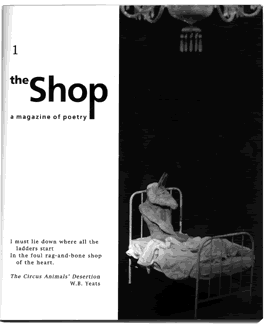|
Three Trumpets for the Shop
 the Shop: a magazine of Poetry the Shop: a magazine of Poetry
Issue Number One, Autumn/Winter 1999 IR4.00
by Tomás Ó Canainn
Surely the publication of a new poetry magazine is an event that merits one or two trumpets. I would even suggest three trumpets for this one, the Shop: a magazine of poetry. The reason for such reckless critical extravagance is that the editor is John Wakeman. Let me explain.
John was co-editor with Michael Mackmin of another poetry magazine, The Rialto, which has been living and breathing for the last fifteen years and will continue under Michael, while the Shop, under John Wakeman's editorship, is now open for submissions and subscriptions at: The Rectory, Toormore, Goleen, Co. Cork. The omens for its healthy continuation are good.
The first issue, printed in Ireland by ColourBooks, with financial assistance from The Arts Council and Cork County Council, is an attractively designed and presented publication, with new poems by more that thirty poets, some twenty of whom live in Ireland. These generally excellent poems are interspersed with a dozen illustrations, though some of these, like Denise Hogan's aquatints, do not transfer well to the printed page: John Minihan's photographs, however, though small, are clear. I am not sure whether the aquatints suffer from a scanning or a printing problem.
What can an occasional scribbler of poems, like myself, say about the best of the poetry that glows on the page. I can report on many things:- an African section peopled by the excellent work of Jack Mapanje, Adam Schwartzmann and David Kerr; the magical Crossroads by John Montague; Medbh Mc Guckian's symbolism (too deep for me); Michael Davitt's The Whisper, saying so quietly what all of us would like to say so well; Fred Johnston on The Now of Love; Rhiannion Wakeman on Love's Short Fallings; Michael Mackmin's A First Meeting, finishing on 'the flickering beat of love'. Bernard O'Donoghue's Growing up with Cullen Feis (for Pádraig Ó h-Icí) sounds the heart-beat of the dance; Derek Mahon speaks, in Michelangelo's voice, of death, as does Gerry Murphy in Ablutions (after Mandelstam). John F. Deane and Jenny Joseph both have a pair of intriguing offerings here.
Four poems from An Duanaire (ed. Seán ó Tuama, with translations by Thomas Kinsella) seem out of place in a magazine of new poetry, though John Wakeman says he intends to indulge in some cross-fertilisation in future issues.
Leland Bardwell's stark Inish Murray is powerful, even frightening, and George Szirtes' Pompeian Red reduces life and colour to every poet's constant companion (whether he or she knows it or not!) - Death. Some poets in this collection have it both ways - they get something off their chest in the public forum of a good poem, without letting us into their secret - whatever it was. This is no bad thing - it simply means that the reader doesn't penetrate into the core of the matter. Liz O'Donoghue's Advoiding the Question, Takashi Arima's My Stamp and Brian Mackey's Panoramas put it to us this way, while Robert Nye's The Cockerel sings rhythmically and splendidly.
Patrick Cotter, in The Monument, writes movingly about his father. Brendan Kennelly, in The Poet's Head, uses the theft of Pádraic Ó Conaire's head from the statue in Galway's Eyre Square to spark off a series of imaginative historical talking heads, which become the last of the new poems in this most welcome magazine, the Shop. I look forward to the next issue and to hearing more of the magic that hovers near and which, when the wand is waved and the right words uttered, becomes poetry.
Tomás Ó Canainn is author of Melos, a collection of his own poetry and of A Lifetime of Notes, memoirs containing some poetry. He has written extensively on Irish music and his piping and singing are available on a number of CDs. |
